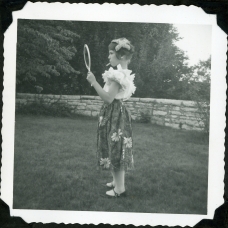
Periodically Facebook posts suggestions such as “Do You Remember These?” accompanied by pictures of household items or TV and movie greats from bygone eras. They tend to be from the early 1950’s to the 1980’s, as Facebook users seem to start with Baby Boomers, and thirty marks the age at which one traditionally begins that downward slope to the grave. The items and people in question are meant to evoke a sense of nostalgia for one’s childhood, to conjure up the smells, sounds and sights of better days.
But what actually marks these times as wonderful, weighing heavier than what the textbooks recount as history? How does one equate the era of Nikita Khrushchev, Eugene McCarthy, atomic bomb drills, and presidential assassination with idyllic childhood? The answer lies in how our parents shielded us.
Today if you ask any parent of a five-year-old child if it is reasonable to allow the child to roam the neighborhood within about a half mile radius from breakfast to dinner, checking in maybe for lunch, that parent will commend you to the authorities for child neglect. For an eight-year-old to walk to the movie theater downtown (three quarters of a mile away) unaccompanied would raise eyebrows as well. And yet we did this back in 1960.
My parents practiced what they called “benign neglect.” As long as we told them the general vicinity we were going to, and which children we were planning to play with, they were content to let us go. In fact, on Sunday afternoons we were shooed out of the house and told to go where we wanted, so long as it wasn’t inside the house of any of our friends. “We are napping and their parents will be too.” God protect you if you ever entered our parents’ bedroom on those days. On rainy or snowy days we could inhabit the downstairs of our home, preferably in the farthest reaches of the house. My personal favorite activity on these days was riding my tricycle on the Persian rugs, something which was strictly verboten. I was headed for Hollywood, and the faster the better.
Tramping in the two-acre wood behind our house was a special pastime. There we built forts, played army, hide-and-seek, and vampires until someone called us for supper. We climbed trees of all sizes, sledded down steep slopes, rode our bikes on all terrains, and paraded the streets in dress-ups. My personal favorite costume character was lady-of-the-night. I’m not sure what I thought she did, other than hike up her skirt and stick out her thumb for a ride, but it seemed glamorous to be one.
Did we get into trouble or get hurt? Of course we did. I hit a root from the sycamore tree and accidentally popped a wheelie on my brother’s banana seat bike, causing me to fly arms-first down our driveway for twenty feet. While attempting an arabesque, I hit a pothole and my foot fell off the fender of my Schwinn, landing in the wheel spokes. My brother and his best friend became lost for hours in a cave which runs under our hometown. I dared a friend to see how far she could shove a kidney bean up her nose, and a doctor at the ER had to remove it. We picked raspberries and blackberries from amidst the poison ivy, and cherries from the tallest trees in the neighborhood. One friend fell thirty feet and broke his arm while trying to wrestle cherries from the upper branches of a tree. We snuck out to smoke cigarettes, kiss boys, and look “tuff.” Would I trade these memories for play dates with someone watching us like a hawk while we play inside with Leggos on a sunny day? Never!
Once my older brother and his friend set off firecrackers around a house up the road, where the “help” was having an unsanctioned party. The noise was very audible, and when the two miscreants arrived moments later, barely able to contain themselves, Daddy issued a decree that if they weren’t in the house the next time said noises occurred, they would both be punished. My father’s best friend was visiting and saw an opportunity. He caught Hugh’s eye and nodded his head toward the kitchen. One after another they filed out, and I right behind them. I got a 16oz Coke from the fridge and watched Homer teach them how to use an unfiltered cigarette as a fuse for a firecracker. I knew better than to give the game away. When loud bangs erupted all around the outside of our house, Daddy was livid. The two teenagers were sitting sedately in the living room. He sputtered and fumed, and then pointed his finger at Homer, “You! You’re the worst, because you think it up!”
My father would have taken a switch to my hide, had he known some of the things I did. My mother had rules, like no roller skating, no riding my bike off our own street, but she erroneously assumed I would ask permission first. My thoughts on the matter were that if it wasn’t specifically forbidden, it was ok, and it was always better to ask for forgiveness than permission. I was less concerned with safety than in not getting caught.
My take-away from this is that our ideas about freedom stem from the parenting styles of our childhoods. One cannot learn how to act and think independently unless one is given the freedom to play and make mistakes. I’m not sure how to translate that to inner city conditions, but I expect there is a way. If we don’t allow our children some arena to explore and think for themselves, they will either rebel in the most dangerous fashion or they will rely on those with the narrowest views to dictate their behavior as adults.
I remember meeting Homer. Great guy. When did he pass?
LikeLike
June 1982
LikeLike